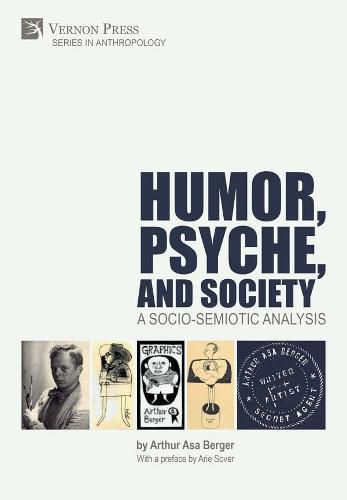Readings Newsletter
Become a Readings Member to make your shopping experience even easier.
Sign in or sign up for free!
You’re not far away from qualifying for FREE standard shipping within Australia
You’ve qualified for FREE standard shipping within Australia
The cart is loading…






This title is printed to order. This book may have been self-published. If so, we cannot guarantee the quality of the content. In the main most books will have gone through the editing process however some may not. We therefore suggest that you be aware of this before ordering this book. If in doubt check either the author or publisher’s details as we are unable to accept any returns unless they are faulty. Please contact us if you have any questions.
It is the age-old saying that laughter is the best medicine . Scientific research has substantiated the claim made by this proverb by verifying the positive effects it has on both our mind and body, but what is it about a good joke, comic, or sitcom that makes us laugh?
Humor, Psyche and Society is a compilation of Berger’s previously published articles and new chapters on the nature of humour, its importance for our psyches, and its social and political significance. Written in an accessible style, it uses semiotics, psychoanalytic theory, sociological theory, as well as other theories of humour to explore the multifaceted nature of humour, various styles of jokes and sitcoms.
Using Berger’s typology of forty-five techniques found in all forms of humour, developed to explain what makes us laugh, this book analyses a variety of humorous texts. Balancing theory, entertaining jokes and other humorous texts, as well as the author’s illustrations, the chapters in this book delve into a diverse range of topics such as humour and the creative process, humour and health, and visual humour; along with an examination of the sitcoms Frasier and Cheers; and finally, the exploration of jokes including Jewish jokes, and jokes on Russia and Communism, and Trump. This book will be of particular interest to university students studying courses in humour, comedy, popular culture, applied semiotics, American politics and culture, and cultural studies. Due to the accessible nature of this book, the general public may find it to be both a fascinating and entertaining read.
$9.00 standard shipping within Australia
FREE standard shipping within Australia for orders over $100.00
Express & International shipping calculated at checkout
This title is printed to order. This book may have been self-published. If so, we cannot guarantee the quality of the content. In the main most books will have gone through the editing process however some may not. We therefore suggest that you be aware of this before ordering this book. If in doubt check either the author or publisher’s details as we are unable to accept any returns unless they are faulty. Please contact us if you have any questions.
It is the age-old saying that laughter is the best medicine . Scientific research has substantiated the claim made by this proverb by verifying the positive effects it has on both our mind and body, but what is it about a good joke, comic, or sitcom that makes us laugh?
Humor, Psyche and Society is a compilation of Berger’s previously published articles and new chapters on the nature of humour, its importance for our psyches, and its social and political significance. Written in an accessible style, it uses semiotics, psychoanalytic theory, sociological theory, as well as other theories of humour to explore the multifaceted nature of humour, various styles of jokes and sitcoms.
Using Berger’s typology of forty-five techniques found in all forms of humour, developed to explain what makes us laugh, this book analyses a variety of humorous texts. Balancing theory, entertaining jokes and other humorous texts, as well as the author’s illustrations, the chapters in this book delve into a diverse range of topics such as humour and the creative process, humour and health, and visual humour; along with an examination of the sitcoms Frasier and Cheers; and finally, the exploration of jokes including Jewish jokes, and jokes on Russia and Communism, and Trump. This book will be of particular interest to university students studying courses in humour, comedy, popular culture, applied semiotics, American politics and culture, and cultural studies. Due to the accessible nature of this book, the general public may find it to be both a fascinating and entertaining read.